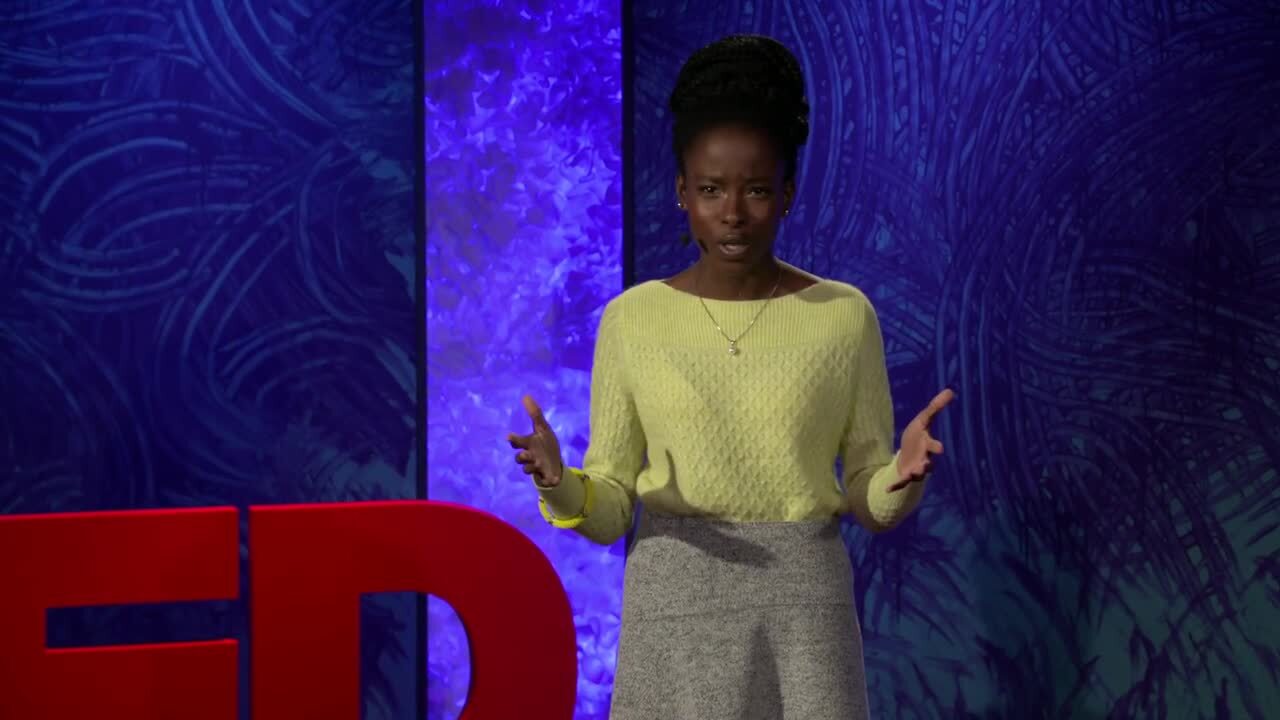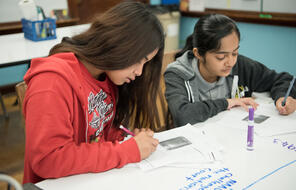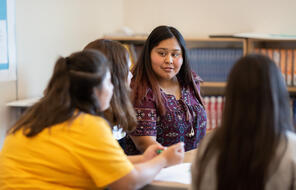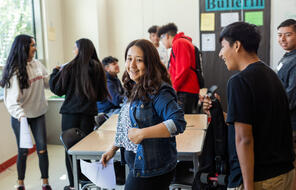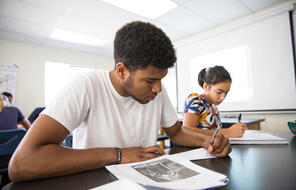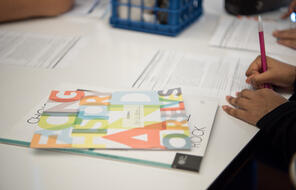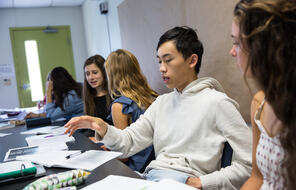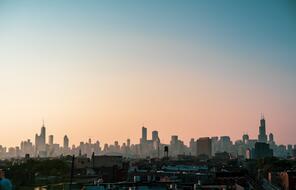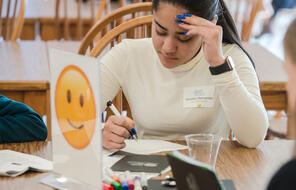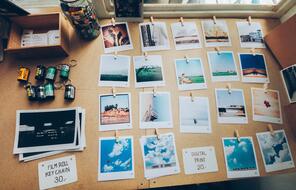[MUSIC PLAYING]
AMANDA GORMAN: I have two questions for you. One, whose shoulders do you stand on, and two, what do you stand for? These are two questions that I always begin in my poetry workshop with students because at times, poetry can seem like this dead art form for, like, old white men who just seem like they were born to be old, like, you know, Benjamin Button or something.
And I ask my students these two questions, and then I share how I answer them, which is in these three sentences that go I am the daughter of Black writers who are descended from freedom fighters who broke their chains and changed the world. They call me. And these are words I repeat in a mantra before every single poetry performance.
In fact, I was doing it in the corner over there, where I was, like, making faces. And so I repeat them to myself as a way to gather myself because I'm not sure if you know, but public speaking is pretty terrifying. I know I'm on stage and I have my heels and I look all glam, but I'm horrified.
[LAUGHTER]
And the way in which I kind of strengthen myself is by having this mantra. Most of my life, I was particularly terrified of speaking up because I had a speech impediment, which made it difficult to pronounce certain letters, sounds, and I felt like I was fine writing on the page, but once I got on stage, I was worried my words might jumble and stumble. What was the point in trying not to mumble these thoughts in my head if everything's already been said before?
But finally, I had a moment of realization where I thought, if I choose not to speak out of fear, then there's no one that my silence is standing for. And so I came to realize that I cannot stand standing to the side, standing silent. I must find the strength to speak up.
And one of the ways I do that is through this mantra where I call back to what I call honorary ancestors. These are people who might not be related to you by blood or by birth but who are more than worth saying their names because you stand on their shoulders all the same. And it's only from the height of these shoulders that we might have the sight to see the mighty power of poetry, the power of language made accessible, expressible.
Poetry is interesting because not everyone is going to become a great poet, but anyone can be, and anyone can enjoy poetry. And it's this openness, this accessibility of poetry that makes it the language of people. Poetry has never been the language of barriers. It's always been the language of bridges. And it's this connection-making that makes poetry, yes, powerful, but it also makes it political.
One of the things that irritates me to no end is when I get that phone call, and it's usually from a white man. And he's like, man, Amanda, we love your poetry. We'd love to get you to write a poem about this subject, but don't make it political. Which to me sounds like I have to draw a square but not make it a rectangle or, like, build a car and not make it a vehicle. It doesn't make much sense because all art is political.
The decision to create, the artistic choice, to have a voice, the choice to be heard is the most political act of all. And by political, I mean poetry is political in at least three ways. One, what stories we tell, when we're telling them, how we're telling them, if we're telling them, why we're telling them says so much about the political beliefs we have about what types of stories matter.
Secondly, who gets to have those stories told? I'm talking who is legally allowed to read? Who has the resources to be able to write? Who are we reading in our classrooms says a lot about the political and educational systems that all these stories and storytellers exist in.
Lastly, poetry is political because it's preoccupied with people. If you look at history, notice that tyrants often go after the poets and the creatives first. They burn books. They try to get rid of poetry and the language arts because they're terrified of them. Poets have this phenomenal potential to connect the beliefs of the private individual with the cause of change of the public, the population, the polity, the political movement.
And when you leave here, I really want you to try to hear the ways in which poetry is actually at the center on our most political questions about what it means to be a democracy. Maybe later, you're going to be at a protest, and someone's going to have a poster that says they buried us, but they didn't know we were seeds. That's poetry. You might be in your US history class, and your teacher may play a video of Martin Luther King, Jr. saying we will be able to hew out of this mountain of despair a stone of hope. That's poetry.
Or maybe even here, in New York City, you're going to go visit the Statue of Liberty. Well, there's a sonnet that declares, as Americans, give us your tired, your poor, your huddled masses yearning to be free. So you see, when someone asks me to write a poem that's not political, what they're really asking me is to not ask charged and challenging questions in my poetic work. And that does not work because poetry is always at the pulse of the most dangerous and the most daring questions that a nation or a world might face. What path do we stand on as a people, and what future as a people do we stand for?
And the thing about poetry is that it's not really about having the right answers. It's about asking these right questions about what it means to be a writer doing right by your words and your actions. And my reaction is to pay honor to those shoulders of people who use their pens to roll over boulders so I might have a mountain of hope on which to stand so that I might understand the power of telling stories that matter no matter what. So that I might realize that if I choose not out of fear, but out of courage to speak, then there's something unique that my words can become.
And all of a sudden, that fear that my words might jumble and stumble go away as I'm humbled by the thoughts of thousands of stories a long time coming that I know are strumming inside me, as I celebrate those people in their time who stood up so this little Black girl could rhyme, as I celebrate and call their names all the same. These people who seem like they were just born to be bold. Maya Angelou, Ntozake Shange, Phillis Wheatley, Lucille Clifton, Gwendolyn Brooks, Joan Wicks, Audre Lorde, and so many more.
It might feel like every story's been told before, but the truth is no one's ever told my story in the way I would tell it as the daughter of Black writers who are descended from freedom fighters who broke their chains and changed the world. They call me. I call them. And one day, I'll write a story right by writing it into tomorrow on this Earth more than worth standing for.
[APPLAUSE]
